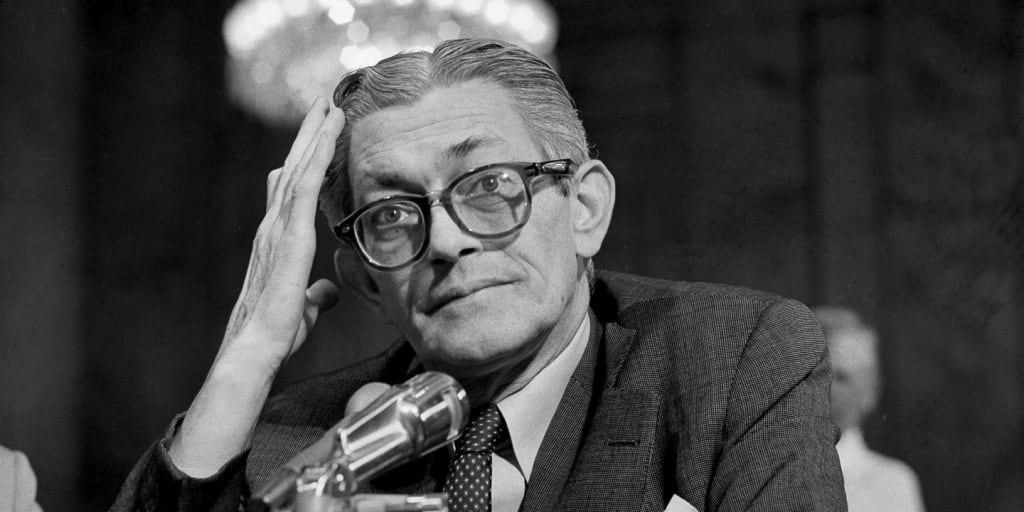Angleton and Buckley's 'Spytime'
Looking Back At William F. Buckley's Novel 'Spytime'

James Jesus Angleton is one of those enigmas that could only have come out of the Cold War era. The long-time head of the CIA's counter-intelligence wing after serving with the agency's precursor organization during World War II, few figures could claim to have had as much of an effect on the secret wars that marked the Cold War as he did. He was a man who remains highly controversial due to his methods, claims of massive Soviet infiltration of Western intelligence agencies, and dozens within the CIA who had their careers affected by his molehunt.
It's no surprise then that writers have used Angleton as the basis for fictional looks into the CIA. Those doing so include Norman Mailer (with his novel Harlot's Ghost) and Eric Roth (who scripted the 2006 film The Good Shepherd). Another author was William F. Buckley, the conservative pundit who not only served for a time within the CIA but wrote a series of novels about the agency, who took on Angleton with his 2000 novel Spytime: The Undoing Of James Jesus Angleton.

Author William F. Buckley
Given the length of Angleton's career, any writer tackling him has their work cut out for them. Buckley's novel covers the width and breadth of it from his work undercover in Italy as an agent of the OSS to his firing from the CIA three decades later. Along the way, the novel takes in a who's who of Cold War era intelligence and political figures including three different CIA directors, the Kennedy brothers, Soviet defector Anatoliy Golitsyn, and the infamous British traitor Kim Philby. It's also an international affair that takes readers from the CIA's Langley headquarters to Beirut and across the United States. Combined with Buckley's previous ventures into the genre, Spytime then has all the ingredients of a first class spy tale based firmly in reality.
Which makes actually reading something of a frustrating experience. Buckley seems not to know how to handle the sheer scale on Angleton's story as the novel drifts back and forth through time. Other writers in the genre have done so (John le Carre among them with some of his best works) but Buckley never makes it feel either organic nor organized enough for it not to be jarring. The novel also seems to go off on numerous tangents that never seem to amount to much in the long run such as the subplot about one of Angleton's proteges. There's also the matter of the book's sometimes liberal altering of historical events to suit the needs of the narrative, something that is at times forgivable given that this is a work of fiction but which comes across as distracting. All of that plays into the rather rushed ending that plays up the novel's subtitle but with a particularly absurd claim that makes one wonder if Buckley was trying to capture the paranoid visions of his protagonist but failed to get it across sufficiently. All of which leaves Spytime feeling unfocused, to put it mildly.
The novel does have its pluses though. Angleton makes for an interesting protagonist and there are times when Buckley wonderfully illustrates both the man and the thinking that made him the most (in)famous mole hunter in the history of American intelligence. The portions of the novel covering Angleton's tradecraft, particularly in his dealings with Golitsyn, make for some nice reading as well. Yet these are nuggets in a proverbial wasteland which brighten up the novel but ultimately aren't able to save it.
Spytime then falls into the category of interesting concepts given perhaps less than worthy executions. Buckley tries to do so much in right around 300 pages that it leaves the whole endeavour to feel loosely bound around an intriguing protagonist rather than a tightly woven tale of Cold War intrigue. Instead of perhaps being the definitive fictional take on Angleton (something Buckley was in a prime position to accomplish), it instead leaves the reader wanting something more.
And not in a good way either...
About the Creator
Matthew Kresal
Matthew Kresal was born and raised in North Alabama though he never developed a Southern accent. His essays have been featured in numerous books and his first novel Our Man on the Hill was published by Sea Lion Press in 2021.






Comments
There are no comments for this story
Be the first to respond and start the conversation.